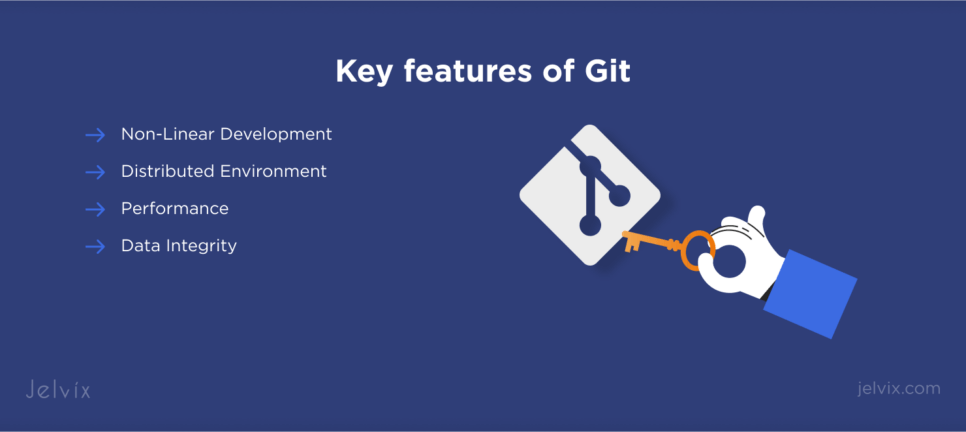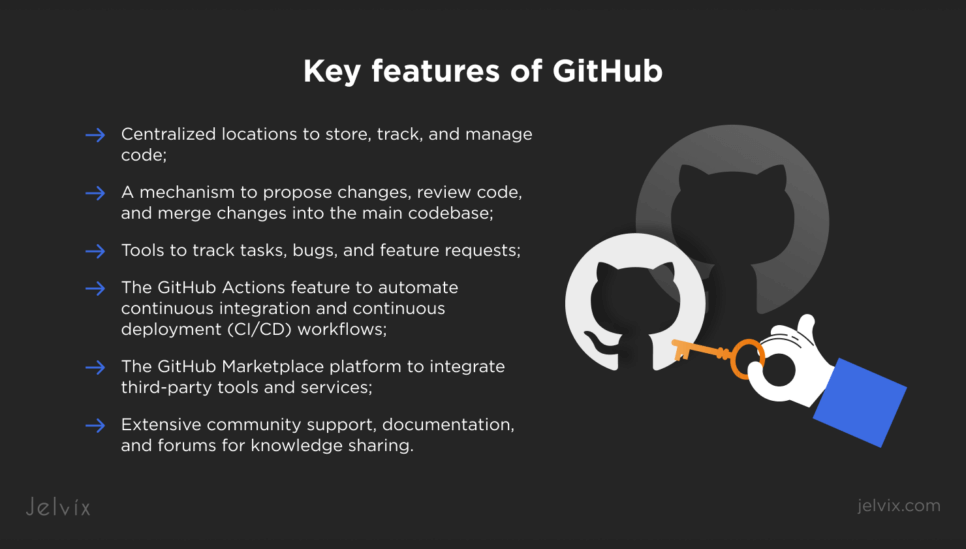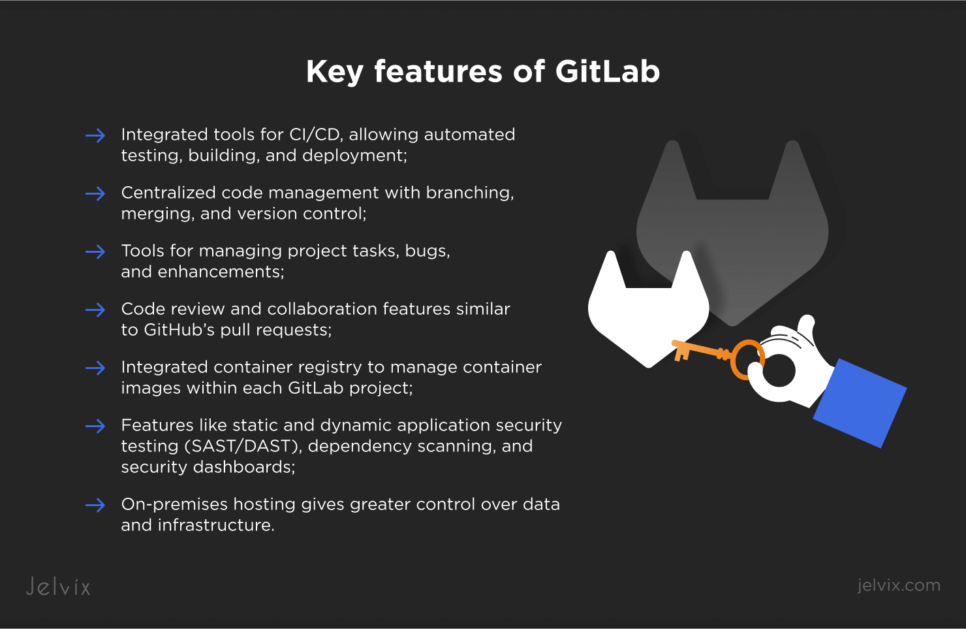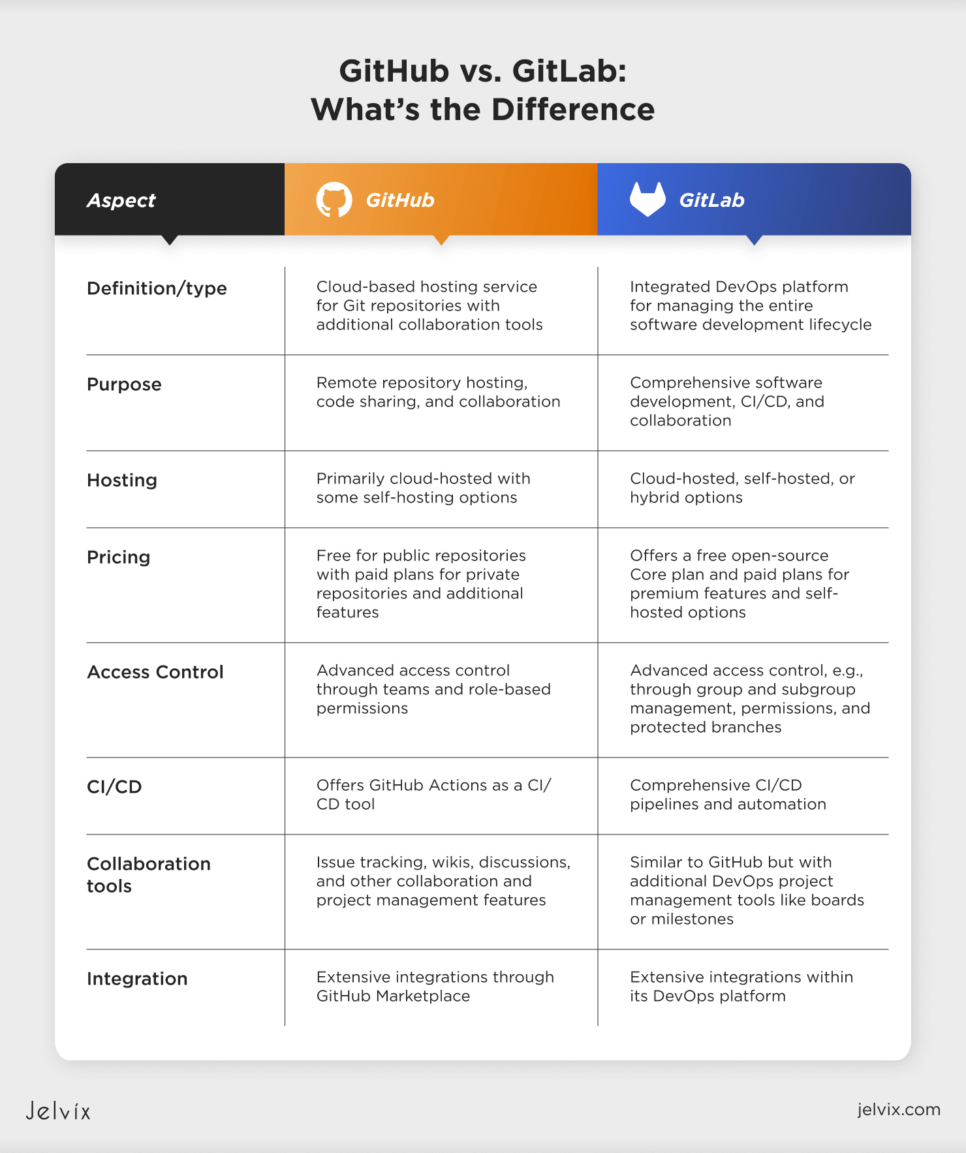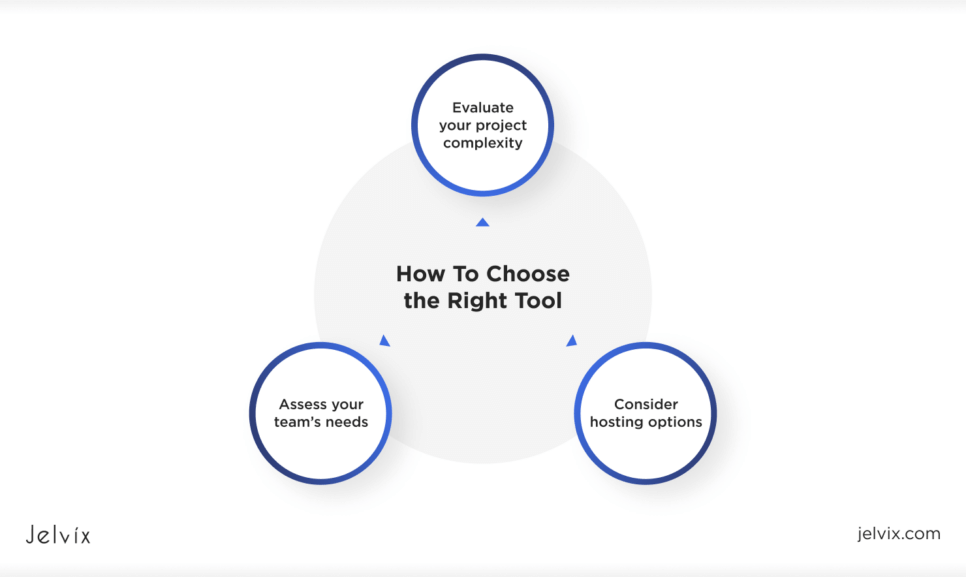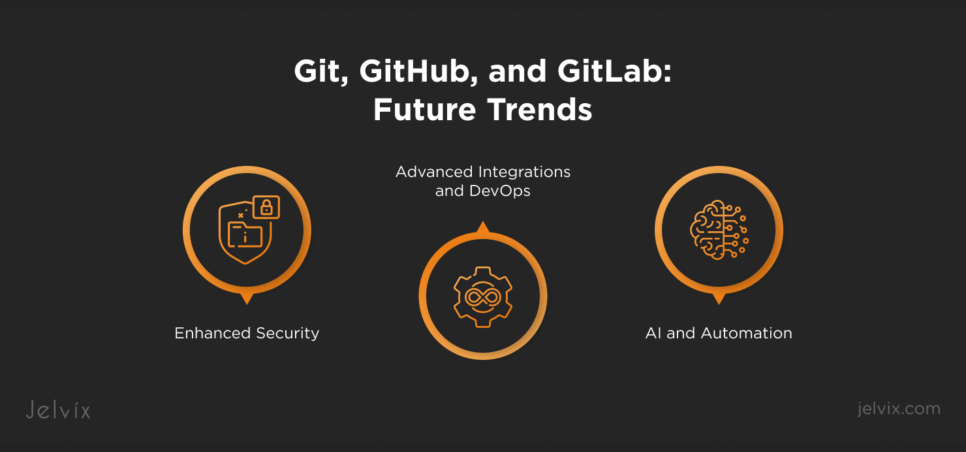Developers who use version control can manage changes to their codebase, track modifications, collaborate with team members, and thus ensure the stability and reliability of the software. Git is the most widely utilized version control system around the world. According to a study by Stack Overflow, more than 93% of developers use Git. It is popular among various industries and companies of all sizes, including open-source projects, startups, and large enterprises.
In this article, we will explore the key features of Git, GitHub, and GitLab and highlight the differences between GitHub and GitLab as hosting services. Understanding the differences and benefits of each option is important when choosing the best service for your project.
General Information about Git and Git Repositories
What is Git?
Git was created by Linus Torvalds in 2005. It is a version control system that helps developers track changes to their projects, revert to earlier versions, and create parallel branches for building and testing new code. The system is the basis for the added functionalities of platforms like GitHub and GitLab.
Key features of Git:
- Non-Linear Development
Thanks to Git’s non-linear development nature, a Git user can work remotely on any part of the project, make necessary changes, and then update the project. Git supports quick branching and merging and offers specific tools for visualizing and navigating a non-linear development history.
- Distributed Environment
Git’s flexible, distributed nature allows developers to collaborate more freely than with centralized systems. Every developer can contribute code to other repositories and maintain public repositories for others to build upon and contribute to.
- Performance
Git is designed for speed and efficiency, utilizing compression and delta encoding to handle large projects efficiently.
- Data Integrity
Git is also a powerful tool for ensuring data integrity. It uses a specific hashing algorithm called SHA-1 to checksum every commit and file content. These checksums are then used to reference data within the repository.
Cloud-Based Git Repositories
Cloud solutions offer many benefits with centralized access, real-time collaboration, and integrated workflows. Several Git repository services are available on the market, including GitHub, SourceForge, Bitbucket, and GitLab. Both GitHub and GitLab, which will be covered in detail in this article, are popular among developers and extend Git’s core functionalities with their additional features, such as issue tracking, continuous integration, and deployment tools.
Benefits of cloud-based repositories:
- Developers have access to their projects from anywhere in the world while working and collaborating remotely;
- Cloud-based platforms ensure optimal performance as projects scale;
- Integrated tools for code reviews, issue tracking, and project management enhance collaboration among team members;
- Cloud-based repositories provide powerful backup and recovery options to reduce the risk of data loss;
- Their security features prevent unauthorized access to repositories through authentication, authorization, and encryption.
What Is GitHub?
GitHub is the most popular cloud-based platform for hosting open-source software development projects. It is known for its user-friendly interface and collaboration tools like pull requests, issue tracking, and project management. The platform can be integrated with various third-party services.
Key features of GitHub:
- Centralized locations to store, track, and manage code;
- Mechanism to propose changes, review code, and merge changes into the main codebase;
- Tools to track tasks, bugs, and feature requests;
- The GitHub Actions feature to automate continuous integration and continuous deployment (CI/CD) workflows;
- The GitHub Marketplace platform to integrate third-party tools and services;
- Extensive community support, documentation, and forums for knowledge sharing.
The fact that you can integrate GitHub with various CI/CD tools and services makes it a preferred option for many development teams. Regarding pricing, GitHub offers a range of plans, including free options for public repositories and enterprise solutions for larger organizations.
Advantages of using GitHub:
- Ease of Use
GitHub’s intuitive interface and extensive documentation make it accessible to developers of all skill levels.
- Collaboration
Tools like pull requests and code reviews facilitate collaboration and improve code quality.
- Community
GitHub’s large user base and active community provide many resources, including open-source projects, tutorials, and forums.
- Integrations
To create seamless development workflows, GitHub integrates with many third-party tools, such as Visual Studio, Jira, or Slack.
- Visibility
GitHub is an excellent platform for open-source projects to showcase their work and attract contributors.
What is GitLab?
GitLab is another platform that offers Git repository hosting but focuses more on the DevOps lifecycle. It comes with built-in CI/CD tools to manage the entire development process, from coding to deployment. Depending on your organizational needs, you can use GitLab as a cloud service or host it on-premises.
Key features of GitLab:
- Integrated tools for CI/CD, allowing automated testing, building, and deployment;
- Centralized code management with branching, merging, and version control;
- Tools for managing project tasks, bugs, and enhancements;
- Code review and collaboration features similar to GitHub’s pull requests;
- Integrated container registry to manage container images within each GitLab project;
- Features like static and dynamic application security testing (SAST/DAST), dependency scanning, and security dashboards;
- On-premises hosting gives greater control over data and infrastructure.
GitLab stands out from other platforms as it covers the entire DevOps lifecycle. It is a “one-stop shop” for code management, testing, and deployment from within one interface. Regarding pricing, GitLab offers both free and premium plans and covers the needs of different development projects.
Advantages of GitLab:
- Integrated DevOps
GitLab offers a complete DevOps toolchain out of the box, so no other tools or integrations are involved.
- Flexibility
GitLab can be hosted on-premises, which gives organizations greater control over their data and infrastructure.
- Comprehensive Security
Built-in security features secure code throughout the whole development lifecycle.
- Scalability
GitLab can scale to meet the needs of small teams and large enterprises alike.
Discover the strategies to effectively scale your engineering team. Uncover essential tips and best practices in our comprehensive guide.
- Community Contributions
GitLab offers an open-core model, where the core functionality is open-source and free, and additional features are available in paid versions. Its open-source version provides a collaborative environment and encourages contributions from the community.
GitHub vs. GitLab
Git serves as the underlying technology for GitHub, GitLab, and other remote hosting services (for more information, see Cloud-Based Git Repositories above). Below is a high-level comparison table of the two platforms’ various aspects to help you understand their differences and similarities.
Use Cases
Small Teams and Individual Developers
GitHub is good for small teams or individual developers who require collaboration tools, issue tracking, project boards, and community support. Because it’s easy to use and integrate with other tools, the platform is often chosen when managing projects with smaller teams.
GitLab is a good fit for small teams that need a solution with integrated CI/CD capabilities. For such teams, a focus on the DevOps lifecycle and a full set of features such as issue tracking and security tools are essential.
Large Enterprises and Organizations
Large organizations choose GitHub for its wide selection of third-party integrations, advanced collaboration features, and various payment plans. GitHub Enterprise, an enterprise version of GitHub, offers security and administration features such as SAML single sign-on, audit logs, and dedicated support.
Enterprises that need a single application for the complete DevOps lifecycle prefer GitLab. The platform offers built-in CI/CD pipelines, security features, and self-hosting options for end-to-end control from code creation to deployment processes.
Open-Source Projects
GitHub is a popular platform for open-source projects because of its strong community, easy-to-use interface, and collaborative features. GitHub encourages community engagement and contribution through features such as forks, stars, and watchers.
GitLab also supports open-source projects and offers many of the same collaboration features as GitHub. Its integrated DevOps tools can benefit open-source projects that require continuous integration and deployment, as well as security testing.
Comparing GitHub and GitLab in Specific Scenarios
Continuous Integration and Continuous Deployment
| GitHub Actions | GitLab CI |
|
You can build, test, and deploy code directly from the repository with GitHub Actions. It works by linking an event on your repository with an action performed by the tool. For example, you can set up an event (e.g., pushing changes to the main branch) to automatically compile and deploy your code to production. Note that GitHub Actions is relatively new, so fewer templated actions or workflows are available than on other platforms. |
GitLab has CI/CD built right in, so no plugins are required. Like GitHub Actions, it automatically builds, tests, and deploys code. The platform’s setup and management of CI/CD pipelines make automation of the entire development lifecycle easier. |
Project Management
| GitHub | GitLab |
|
You can use repositories, issues, task lists, projects, and other tools on GitHub to organize and track your project progress. It can be either an individual project or a cross-functional one. In addition, there are project boards to visualize the organization of tasks and workflows. |
GitLab provides access to popular project management tools such as issues, boards, milestones, and epics. More advanced features like time tracking and burndown charts provide insights into the project’s progress and team productivity. |
Security and Compliance
| GitHub | GitLab |
|
Companies use GitHub’s security features like secret scanning, dependency vulnerability alerts, and code scanning to identify and address security risks. For extra safety of code and its dependencies, GitHub released the GitHub Advanced Security solution. It advances security analysis, including secret detection |
The platform provides built-in SAST/DAST, container scanning, and dependency scanning.
Its security dashboards and compliance management tools help development teams monitor and enforce security policies throughout the development lifecycle. |
How To Choose the Right Tool
Choosing the right tool for your software development needs depends on various factors, including team size, project requirements, and preferred workflows (see above). Here are some basic considerations listed to help make an informed decision:
- Assess your team needs:
- Ask yourself about your collaboration requirements. GitHub might be the best choice if you need a user-friendly interface with integration options available and prioritize collaboration.
- GitLab suits those interested in a comprehensive DevOps solution with integrated CI/CD, security, and automation features. It is designed as a dedicated DevOps platform and will simplify the entire development workflow.
- Analyze version control requirements. Git’s distributed architecture and performance are ideal for basic version control needs without additional collaboration or DevOps features. For advanced version control, GitHub or GitLab will be more suitable.
- Evaluate your project complexity:
- If your project involves several individual developers or a small team working on a less complex project, you can benefit from Git’s simplicity or GitHub’s collaboration tools.
- If your project involves many complex workflows and extensive testing and deployment needs, you may find GitLab’s integrated DevOps platform more beneficial.
- Consider hosting options:
- You may prefer a cloud-based solution with easy access and scalability – both GitHub and GitLab provide strong cloud hosting options.
- However, use GitLab’s flexible self-hosting capabilities if your organization has specific security and compliance requirements.
Future Trends
As software development practices evolve, the supporting tools also advance. Here are our insights into the future trends and advancements in version control and DevOps platforms.
Enhanced Security
Numerous studies show a growing emphasis on security in software development. Thus, GitHub and GitLab will probably continue improving their security features. We anticipate these platforms will integrate more advanced security testing features, vulnerability management, and compliance tools.
AI and Automation
The emergence of artificial intelligence (AI) and automation has significantly transformed software engineering and advanced its technology. Both GitHub and GitLab are likely to invest in AI, which can include automated code reviews, intelligent test generation, and predictive analytics.
Advanced Integrations and DevOps
Furthermore, there is an increasing need for integration with various tools and services as development ecosystems continue to expand. Both GitHub and GitLab are expected to improve their integration capabilities with popular development, testing, and deployment tools.
Given the growing momentum of the DevOps movement, platforms like GitLab, which already offer comprehensive DevOps toolchains, will continue to evolve. We can anticipate the introduction of new features aimed at streamlining the entire DevOps lifecycle, covering everything from planning and coding to testing, deployment, and monitoring.
Conclusion
It’s essential to understand the differences between Git, GitHub, and GitLab to choose the best tool for your software development needs. Git is a version control system that allows for non-linear development and provides flexibility and control. Both GitHub and GitLab are built upon Git’s core features and offer additional tools such as issue tracking, continuous integration, and deployment. The choice between GitHub and GitLab depends on specific requirements and preferences, as each platform has its strengths. As the software development landscape continues to evolve, GitHub and GitLab will likely introduce more features to meet the changing needs of developers and development teams.
Interested in using Git, GitHub, or GitLab for your project? Consider reaching out to experienced developers who are familiar with all three, as they can assist you in making the best choice for your needs. Contact us to receive an estimate based on our experience.
FAQ
What are the advantages of using Git?
Its main advantages include distributed architecture, branching, and merging features, making it well-suited for non-linear development. In other words, developers can maintain the complete project history locally and avoid conflicts and unintentional code overrides. The platform makes the development process flexible and easy to control.
Is GitHub open source?
GitHub is not entirely open source. It is rather a hub for open-source software development. You can access many open-source projects hosted on the platform.
How can developers use GitHub to collaborate with each other?
GitHub is well-known for its collaboration features, which include pull requests, code reviews, and issue tracking. Developers can propose changes, discuss improvements, and manage project tasks collectively. In addition, its integration with various CI/CD tools helps automate testing and deployment processes.
What are GitLab’s features for DevOps?
The platform has integrated CI/CD pipelines, a container registry, and Kubernetes integration to ensure that development teams have a smooth DevOps experience.
What do GitHub and GitLab have to offer in terms of security?
Both platforms provide opportunities to integrate security into the development process. GitHub offers security features such as dependency vulnerability alerts, secret scanning, and code scanning to mitigate potential security issues. GitLab has similar security features, such as SAST/DAST, container scanning, and dependency scanning.
What are the community and support systems like on GitHub and GitLab?
GitHub has a larger and more active community, extensive documentation, forums, and numerous third-party integrations. The platform provides more advanced and accessible support for developers. GitLab, while offering robust documentation and enterprise support plans, focuses more on community contributions through its open-source model.
Need a qualified team of developers?
Extend your development capacity with the dedicated team of professionals.


